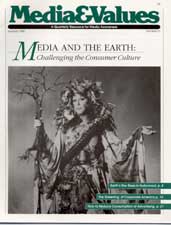CHILDREN: Finding Green Lessons in Fast Food
|
This article originally appeared in Issue# 51
|
Children respond well to events such as Earth Day. Youth group projects, school lessons and community activities combined with media programs to forge a cause around which children could rally. But what can children do now that the celebration is over? How can they intro-duce continuing changes into their lives? And what does all of this have to do with their interactions with the media?
In order for children to understand and act on causes like the environmental movement they need concrete ideas with which they can identify. Like adults, they need to become conscious of everyday activities that impact their environment. Raising children's awareness of the environmental effects of fast-food packaging is one way to connect environmental issues with the day to day events in children's lives. Most parents are familiar with the lure of fast food meals and the way the constant merchandising of McDonald's, Burger King and other chains appeal to their child customers.
A simple experiment can help children learn about the environmental impact of the polystyrene that encloses their hamburgers and fries. Layer a glass jar with gravel and moistened dirt and add some typical trash, including paper and polystyrene. Cover this with more dirt and add more layers as desired. Keep the material for a week or two. The contrast in the nature of the remains can help children focus on the problems created by the packaging of their favorite treats. Lessons about the effects of Latin American beef production on rainforests can also be part of the discussion.
This and similar experiments can provide a framework for children to define their own personal goals. They can discuss whether to avoid restaurants that use polystyrene, buy only sandwiches wrapped in paper, choose restaurants that use reusable dishes and/or write to the companies that produce the trash — and the TV commercials. If children can learn to see the relationships between the advertising, the programming and their own choices, a major shift in their environmental thinking can begin. Like the rest of us, they need to learn that they can make a difference.



